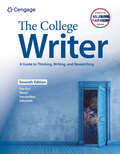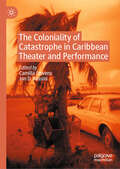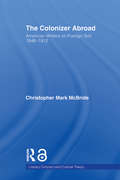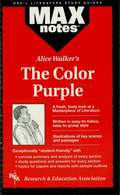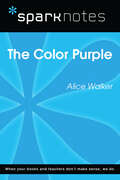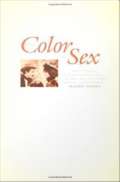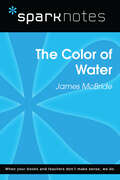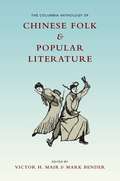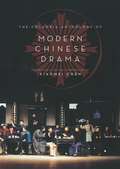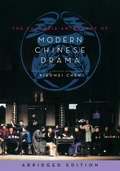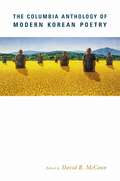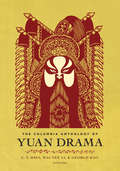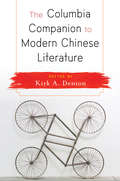- Table View
- List View
The College Writer: A Guide to Thinking, Writing, and Researching with 2021 MLA and 2020 APA Updates
by Verne Meyer Pat Sebranek John Van Rys Randall VanderMeyGuide your students through the process of composing critical academic and research-based essays with Van Rys/Meyer/VanderMey/Sebranek's THE COLLEGE WRITER: A GUIDE TO THINKING, WRITING, AND RESEARCHING, 7E. This fully updated four-in-one resource provides a rhetoric, reader, research guide, and complete handbook for writers of any skill level. Updated professional and student writing samples highlight important features of academic writing -- from organization to documentation -- while modeling strategies and timely topics students can use in their own writing. Revisions strengthen instruction on the role of critical reading as well as paragraph writing and thesis development in the composing process. In addition, this revision includes a focus on evaluating and composing multimodal texts. With MindTap, students can choose an online, multimedia learning experience with an eBook, audio and video, assessments, weblinks, and bonus content on multimodal writing, test-taking, workplace writing, and oral presentations.
The Colonial Construction of Indian Country: Native American Literatures and Federal Indian Law (Indigenous Americas)
by Eric CheyfitzA guide to the colonization and projected decolonization of Native America In The Colonial Construction of Indian Country, Eric Cheyfitz mounts a pointed historical critique of colonialism through careful analysis of the dialogue between Native American literatures and federal Indian law. Illuminating how these literatures indict colonial practices, he argues that if the decolonization of Indian country is to be achieved, then federal Indian law must be erased and replaced with independent Native nation sovereignty—because subordinate sovereignty, the historical regime, is not sovereignty at all. At the same time, Cheyfitz argues that Native American literatures, specifically U.S. American Indian literatures, cannot be fully understood without a knowledge of U.S. federal Indian law: the matrix of colonialism in Indian country. Providing intersectional readings of a range of literary and legal texts, he discusses such authors as Louise Erdrich, Frances Washburn, James Welch, Gerald Vizenor, Simon Ortiz, Leslie Marmon Silko, and others. Cheyfitz examines how American Indian writers and critics have responded to the impact of law on Native life, revealing recent trends in Native writing that build upon traditional modes of storytelling and governance. With a focus on resistance to the colonial regime of federal Indian law, The Colonial Construction of Indian Country not only elucidates how Native American literatures and federal Indian law are each crucial to any reading of the other, it also guides readers to better understand the genocidal assault on Indigenous peoples by Western structures of literacy, politics, and law.
The Colonial Rise of the Novel
by Firdous AzimIn this challening book, Firdous Azim, provides a feminist critique of orthodox accounts of the `rise of the novel' and exposes the underlying orientalist assumptions of the early English novel. Whereas previous studies have emphasized the universality of the coherent and consistent subject which found expression in the novels of the eighteenth century, Azim demonstrtes how certain categories: women and people of colour, were silenced and excluded. The Colonial Rise of the Novel makes an important and provocative contribution to post-colonial and feminist criticism. It will be essential reading for all teachers and students of English literature, women's studies, and post-colonial criticism.
The Coloniality of Catastrophe in Caribbean Theater and Performance
by Camilla Stevens Jon D. RossiniThe Coloniality of Catastrophe in Caribbean Theater and Performance calls attention to theater&’s capacity to reveal the constructed roots of catastrophe and offer counter catastrophic strategies to live and imagine otherwise. Engaging anglophone, francophone, and hispanophone theater from across the Caribbean and its diaspora, the 12 essays and one interview foster a pan-Caribbean view of theater, identifying shared tropes and theatrical strategies. Essays address a range of 20th and 21st century works that center the relentless cycle of &“natural&” disasters such as earthquakes, hurricanes, and floods as well as the catastrophic effects of continuing coloniality more broadly. In doing so, they unsettle the normalization of catastrophe. Exploring the power of theater&’s situatedness, its iterative quality, and its special arrangement of time, these works remind us of the impact of embodied co-presence in the political realities of everyday life.
The Colonizer Abroad: Island Representations in American Prose from Herman Melville to Jack London (Literary Criticism and Cultural Theory)
by Christopher McBrideLooking at a diverse series of authors--Herman Melville, Richard Henry Dana, Jr., Mark Twain, Charles Warren Stoddard, and Jack London--"The Colonizer Abroad" claims that as the U.S. emerged as a colonial power in the nineteenth and twentieth centuries, the literature of the sea became a literature of imperialism. This book applies postcolonial theory to the travel writing of some of America's best-known authors, revealing the ways in which America's travel fiction and nonfiction have both reflected and shaped society.
The Color Purple (MAXNotes Literature Guides)
by Christopher HubertREA's MAXnotes for Alice Walker's The Color Purple MAXnotes offer a fresh look at masterpieces of literature, presented in a lively and interesting fashion. Written by literary experts who currently teach the subject, MAXnotes will enhance your understanding and enjoyment of the work. MAXnotes are designed to stimulate independent thought about the literary work by raising various issues and thought-provoking ideas and questions. MAXnotes cover the essentials of what one should know about each work, including an overall summary, character lists, an explanation and discussion of the plot, the work's historical context, illustrations to convey the mood of the work, and a biography of the author. Each chapter is individually summarized and analyzed, and has study questions and answers.
The Color Purple (SparkNotes Literature Guide Series)
by SparkNotesThe Color Purple (SparkNotes Literature Guide) by Alice Walker Making the reading experience fun! Created by Harvard students for students everywhere, SparkNotes is a new breed of study guide: smarter, better, faster.Geared to what today's students need to know, SparkNotes provides:chapter-by-chapter analysis explanations of key themes, motifs, and symbols a review quiz and essay topics Lively and accessible, these guides are perfect for late-night studying and writing papers.
The Color of Sex: Whiteness, Heterosexuality, and the Fictions of White Supremacy
by Mason StokesIn The Color of Sex Mason Stokes offers new ways of thinking about whiteness by exploring its surprisingly ambivalent partnership with heterosexuality. Stokes examines a wide range of white-supremacist American texts written and produced between 1852 and 1915--literary romances, dime novels, religious and scientific tracts, film--and exposes whiteness as a tangled network of racial and sexual desire. Stokes locates these white-supremacist texts amid the anti-racist efforts of African American writers and activists, deepening our understanding of both American and African American literary and cultural history. The Color of Sex reveals what happens when race and sexuality meet, when white desire encounters its own ambivalence. As Stokes argues, whiteness and heterosexuality exist in anxious relation to one another. Mutually invested in "the normal," they support each other in their desperate insistence on the cultural logic of exclusion. At the same time, however, they threaten one another in their attempt to create and sustain a white future, since reproducing whiteness necessarily involves the risk of contamination Charting the curious movements of this "white heterosexuality," The Color of Sex inaugurates a new moment in our ongoing attempt to understand the frenzied interplay of race and sexuality in America. As such, it will appeal to scholars interested in race theory, sexuality studies, and American history, culture, and literature.
The Color of Water (SparkNotes Literature Guide Series)
by SparkNotesThe Color of Water (SparkNotes Literature Guide) by James McBride Making the reading experience fun! Created by Harvard students for students everywhere, SparkNotes is a new breed of study guide: smarter, better, faster.Geared to what today's students need to know, SparkNotes provides:chapter-by-chapter analysis explanations of key themes, motifs, and symbols a review quiz and essay topics Lively and accessible, these guides are perfect for late-night studying and writing papers.
The Colors of Zion: Blacks, Jews, and Irish from 1845 to 1945
by George BornsteinA major reevaluation of relationships among Blacks, Jews, and Irish in the years between the Irish Famine and the end of World War II, The Colors of Zion argues that the cooperative efforts and sympathies among these three groups, each persecuted and subjugated in its own way, was much greater than often acknowledged today. For the Black, Jewish, and Irish writers, poets, musicians, and politicians at the center of this transatlantic study, a sense of shared wrongs inspired repeated outpourings of sympathy. If what they have to say now surprises us, it is because our current constructions of interracial and ethnic relations have overemphasized conflict and division. As George Bornstein says in his Introduction, he chooses “to let the principals speak for themselves.” While acknowledging past conflicts and tensions, Bornstein insists on recovering the “lost connections” through which these groups frequently defined their plights as well as their aspirations. In doing so, he examines a wide range of materials, including immigration laws, lynching, hostile race theorists, Nazis and Klansmen, discriminatory university practices, and Jewish publishing houses alongside popular plays like The Melting Pot and Abie’s Irish Rose, canonical novels like Ulysses and Daniel Deronda, music from slave spirituals to jazz, poetry, and early films such as The Jazz Singer. The models of brotherhood that extended beyond ethnocentrism a century ago, the author argues, might do so once again today, if only we bear them in mind. He also urges us to move beyond arbitrary and invidious categories of race and ethnicity.
The Colossus Of Maroussi
by Will Self Henry Miller Ian S. MacnivenLike the ancient colossus that stood over the harbor of Rhodes, Henry Miller’s The Colossus of Maroussi stands as a seminal classic in travel literature. It has preceded the footsteps of prominent travel writers such as Pico Iyer and Rolf Potts. The book Miller would later cite as his favorite began with a young woman’s seductive description of Greece. Miller headed out with his friend Lawrence Durrell to explore the Grecian countryside: a flock of sheep nearly tramples the two as they lie naked on a beach; the Greek poet Katsmbalis, the colossus of Miller’s book, stirs every rooster within earshot of the Acropolis with his own loud crowing; cold hard-boiled eggs are warmed in a village’s single stove, and they stay in hotels that have seen better days, but which have an aroma of the past.
The Columbia Anthology of Chinese Folk and Popular Literature (Translations from the Asian Classics)
by Victor H. Mair Mark Bender Eds.In The Columbia Anthology of Chinese Folk and Popular Literature, two of the world's leading sinologists, Victor H. Mair and Mark Bender, capture the breadth of China's oral-based literary heritage. This collection presents works drawn from the large body of oral literature of many of China's recognized ethnic groups-including the Han, Yi, Miao, Tu, Daur, Tibetan, Uyghur, and Kazak-and the selections include a variety of genres. Chapters cover folk stories, songs, rituals, and drama, as well as epic traditions and professional storytelling, and feature both familiar and little-known texts, from the story of the woman warrior Hua Mulan to the love stories of urban storytellers in the Yangtze delta, the shaman rituals of the Manchu, and a trickster tale of the Daur people from the forests of the northeast. The Cannibal Grandmother of the Yi and other strange creatures and characters unsettle accepted notions of Chinese fable and literary form. Readers are introduced to antiphonal songs of the Zhuang and the Dong, who live among the fantastic limestone hills of the Guangxi Zhuang Autonomous Region; work and matchmaking songs of the mountain-dwelling She of Fujian province; and saltwater songs of the Cantonese-speaking boat people of Hong Kong. The editors feature the Mongolian epic poems of Geser Khan and Jangar; the sad tale of the Qeo family girl, from the Tu people of Gansu and Qinghai provinces; and local plays known as "rice sprouts" from Hebei province. These fascinating juxtapositions invite comparisons among cultures, styles, and genres, and expert translations preserve the individual character of each thrillingly imaginative work.
The Columbia Anthology of Modern Chinese Drama
by Xiaomei ChenThe first of its kind in English, this anthology presents translations of twenty-two popular plays published between 1919 and 2000, accompanied by an introduction to the historical, cultural, and aesthetic evolution of twentieth-century Chinese spoken drama. Primarily comprising works from the People's Republic of China, though including representative plays from Hong Kong and Taiwan, this collection showcases more than the revolutionary rethinking of Chinese theater and performance that began in the late Qing dynasty. It also reflects the formation of Chinese national and gender identities during a period of tremendous social and political change, as well as the genesis of contemporary attitudes toward the West.Early twentieth-century Chinese drama embodies the uncertainty and anxiety brought on by modernism, socialism, political conflict, and war. After 1949, the PRC theater paints a complex portrait of the rise of Communism in China, with the ideals of Chinese socialism juxtaposed against the sacrifices made for a new society. The Cultural Revolution promoted a "model theater" cultivated from the achievements of earlier, leftist spoken drama, despite the fact that this theater arose from the destruction of old culture. Post-Mao drama addresses the Chairman's legacy and the attempts of a wounded nation to reexamine its cultural roots. Taiwan's spoken drama uniquely synthesizes regional and foreign traditions, and Hong Kong's spoken drama sparkles as a hybrid of Chinese and Western influences. Immensely valuable for scholars of cross-disciplinary, comparative, and performance study, this anthology offers essential perspective on the theatricality and representation of political life.
The Columbia Anthology of Modern Chinese Drama (Weatherhead Books on Asia)
by Ed. Chen XiaomeiThe first of its kind in English, this anthology translates twenty-two popular Chinese plays published between 1919 and 2000, accompanied by a critical introduction to the historical, cultural, and aesthetic evolution of twentieth-century Chinese spoken drama. Primarily comprising works from the People's Republic of China, though including representative plays from Hong Kong and Taiwan, this collection not only showcases the revolutionary rethinking of Chinese theater and performance that began in the late Qing dynasty. It also highlights the formation of Chinese national and gender identities during a period of tremendous social and political change, along with the genesis of contemporary attitudes toward the West.Early twentieth-century Chinese drama embodies the uncertainty and anxiety brought on by modernism, socialism, political conflict, and war. After 1949, PRC theater painted a complex portrait of the rise of communism in China, with the ideals of Chinese socialism juxtaposed against the sacrifices made for a new society. The Cultural Revolution promoted a "model theater" cultivated from the achievements of earlier, leftist spoken drama, even though this theater arose from the destruction of old culture. Post-Mao drama addresses the socialist legacy and the attempts of a wounded nation to reexamine its cultural roots. Taiwan's spoken drama synthesizes regional and foreign traditions, and Hong Kong's spoken drama sparkles as a hybrid of Chinese and Western influences. Immensely valuable for cross-disciplinary, comparative, and performance study, this anthology provides essential perspective on China's theatricality and representation of political life.
The Columbia Anthology of Modern Chinese Drama: abridged edition (Weatherhead Books on Asia)
by Xiaomei ChenThis condensed anthology reproduces close to a dozen plays from Xiaomei Chen's well-received original collection, The Columbia Anthology of Modern Chinese Drama, along with her critical introduction to the historical, cultural, and aesthetic evolution of twentieth-century Chinese spoken drama. Comprising representative works from the Republican era to postsocialist China, the book encapsulates the revolutionary rethinking of Chinese theater and performance that began in the late Qing dynasty and vividly portrays the uncertainty and anxiety brought on by modernism, socialism, political conflict, and war. Chosen works from 1919 to 1990 also highlight the formation of national and gender identities during a period of tremendous social, cultural, and political change in China and the genesis of contemporary attitudes toward the West. PRC theater tracks the rise of communism, juxtaposing ideals of Chinese socialism against the sacrifices made for a new society. Post-Mao drama addresses the nation's socialist legacy, its attempt to reexamine its cultural roots, and postsocialist reflections on critical issues such as nation, class, gender, and collective memories. An essential, portable guide for easy reference and classroom use, this abridgment provides a concise yet well-rounded survey of China's theatricality and representation of political life. The original work not only established a canon of modern Chinese drama in the West but also made it available for the first time in English in a single volume.
The Columbia Anthology of Modern Japanese Literature (Abridged Edition)
by Van C. Gessel J. Thomas RimerJapanese literature.
The Columbia Anthology of Modern Japanese Literature, Volume 1: From Restoration to Occupation, 1868-1945
by Gessel Van C. J. Thomas RimerFirst volume of Japanese literature anthology.
The Columbia Anthology of Modern Japanese Literature: Abridged (Modern Asian Literature Series)
by J. Thomas RimerFeaturing choice selections from the core anthologies The Columbia Anthology of Modern Japanese Literature: From Restoration to Occupation, 1868–1945, and The Columbia Anthology of Modern Japanese Literature: From 1945 to the Present, this collection offers a concise yet remarkably rich introduction to the fiction, poetry, drama, and essays of Japan's modern encounter with the West. Spanning a period of exceptional invention and transition, this volume is not only a critical companion to courses on Japanese literary and intellectual development but also an essential reference for scholarship on Japanese history, culture, and interactions with the East and West.The first half covers the three major styles of literary expression that informed Japanese writing and performance in the late nineteenth and early twentieth centuries: classical Japanese fiction and drama, Chinese poetry, and Western literary representation and cultural critique. Their juxtaposition brilliantly captures the social, intellectual, and political challenges shaping Japan during this period, particularly the rise of nationalism, the complex interaction between traditional and modern forces, and the encroachment of Western ideas and writing. The second half conveys the changes that have transformed Japan since the end of the Pacific War, such as the heady transition from poverty to prosperity, the friction between conflicting ideologies and political beliefs, and the growing influence of popular culture on the country's artistic and intellectual traditions. Featuring sensitive translations of works by Nagai Kafu, Natsume Soseki, Oe Kenzaburo, Kawabata Yasunari, Mishima Yukio, and many others, this anthology relates an essential portrait of Japan's dynamic modernization.
The Columbia Anthology of Modern Japanese Literature: Volume 1: From Restoration to Occupation, 1868-1945 (Modern Asian Literature Series)
by J. Thomas Rimer Van GesselThis comprehensive anthology collects works of fiction, poetry, drama, and essay-writing from a pivotal time in Japanese history. In addition to their literary achievements, the texts reflect the political, social, and intellectual changes that occurred in Japanese society during this period, including exposure to Western ideas and literature, the rise of nationalism, and the complex interaction of traditional and modern forces. The volume offers outstanding, often new translations of classic texts by such celebrated writers as Nagai Kafu, Shimazaki Toson, Natsume Soseki, Kawabata Yasunari, and Yosano Akiko. The editors have also unearthed works from lesser-known women writers, many of which have never been available in English. Organized chronologically and by genre within each period, the volume reveals the major influences in the development of modern Japanese literature: the Japanese classics themselves, the example of Chinese poetry, and the encounter with Western literature and culture. Modern Japanese writers reread the classics of Japanese literature, infused them with contemporary language, and refashioned them with an increased emphasis on psychological elements. They also reinterpreted older aesthetic concepts in light of twentieth-century mentalities. While modern ideas captured the imagination of some Japanese writers, the example of classical Chinese poetry remained important for others. Meiji writers continued to compose poetry in classical Chinese and adhere to a Confucian system of thought. Another factor in shaping modern Japanese literature was the example of foreign works, which offered new literary inspiration and opportunities for Japanese readers and writers. Divided into four chapters, the anthology begins with the early modern texts of the 1870s, continues with works written during the years of social change preceding World War I and the innovative writing of the interwar period, and concludes with texts from World War II. Each chapter includes a helpful critical introduction, situating the works within their literary, political, and cultural contexts. Additionally, there are biographical introductions for each writer.
The Columbia Anthology of Modern Korean Poetry
by Ed. David McCannKorea's modern poetry is filled with many different voices and styles, subjects and views, moves and countermoves, yet it still remains relatively unknown outside of Korea itself. This is in part because the Korean language, a rich medium for poetry, has been ranked among the most difficult for English speakers to learn. The Columbia Anthology of Modern Korean Poetry is the only up-to-date representative gathering of Korean poetry from the twentieth century in English, far more generous in its selection and material than previous anthologies. It presents 228 poems by 34 modern Korean poets, including renowned poets such as So Chongju and Kim Chiha.
The Columbia Anthology of Yuan Drama
by George Kao C. T. Hsia Wai-Yee LiThis anthology features translations of ten seminal plays written during the Yuan dynasty (1279--1368), a period considered the golden age of Chinese theater. By turns lyrical and earthy, sentimental and ironic, Yuan drama spans a broad emotional, linguistic, and stylistic range. Combining sung arias with declaimed verses and doggerels, dialogues and mime, and jokes and acrobatic feats, Yuan drama formed a vital part of China's culture of performance and entertainment in the thirteenth and fourteenth centuries.To date, few Yuan-dynasty plays have been translated into English. Well-known translators and scholars have supervised the making of this collection and add a short description to each play. A general introduction situates all selections within their cultural and historical contexts.
The Columbia Anthology of Yuan Drama (Translations from the Asian Classics)
by Hsia C. T. Li George Kao Wai-YeeThis anthology features translations of ten seminal plays written during the Yuan dynasty (1279–1368), a period considered the golden age of Chinese theater. By turns lyrical and earthy, sentimental and ironic, Yuan drama spans a broad emotional, linguistic, and stylistic range. Combining sung arias with declaimed verses and doggerels, dialogues and mime, and jokes and acrobatic feats, Yuan drama formed a vital part of China's culture of performance and entertainment in the thirteenth and fourteenth centuries.To date, few Yuan-dynasty plays have been translated into English. Well-known translators and scholars have supervised the making of this collection and add a short description to each play. A general introduction situates all selections within their cultural and historical contexts.
The Columbia Companion to Modern Chinese Literature
by Kirk A. DentonMore than fifty short essays centered on specific writers and literary trends create an engaging and easily digestible history of Chinese literature from the Qing period (1895-1911) to today. The essays in this volume can be read sequentially for a chronological account or separately in conjunction with reading the literary works in Chinese or English-language translation. Each entry features author names and titles, as well as key terms and references, in English and in Chinese characters for readers who know or are learning Chinese, and each concludes with a bibliography of relevant primary and secondary sources.The volume opens with eight thematic essays addressing general issues in the study of Chinese literature: the ethics of writing a literary history, the formation of the canon, the relationship between language and form, the influence of literary institutions and communities, the effects of censorship, and the role of different media on the development of literature. Subsequent essays focus on authors, their works, and their schools, with entries on Wang Anyi, Eileen Chang, Shen Congwen, Yu Dafu, Mao Dun, Xiao Hong, Yang Jiang, Ba Jin, Yan Lianke, Ding Ling, Liang Qichao, Lao She, Wang Shuo, Zhu Tianwen, Zhu Tianxin, Xi Xi, Gao Xingjian, Lu Xun, Mo Yan, and Qian Zhongshu. Woven throughout are more general pieces on late Qing fiction, popular entertainment fiction, martial arts fiction, experimental theater, post-Mao avant-garde poetry in China, post-martial law fiction from Taiwan, contemporary genre fiction from China, and recent Internet literature, among other topics. Both a teaching tool and a go-to research companion, this volume is a one-of-a-kind resource for mastering modern literature in the Chinese-speaking world.
The Columbia Companion to Modern Chinese Literature
by Kirk A. DentonThe Columbia Companion to Modern Chinese Literature features more than fifty short essays on specific writers and literary trends from the Qing period (1895–1911) to the present. The volume opens with thematic essays on the politics and ethics of writing literary history, the formation of the canon, the relationship between language and form, the role of literary institutions and communities, the effects of censorship, the representation of the Chinese diaspora, the rise and meaning of Sinophone literature, and the role of different media in the development of literature. Subsequent essays focus on authors, their works, and the schools with which they were aligned, featuring key names, titles, and terms in English and in Chinese characters. Woven throughout are pieces on late Qing fiction, popular entertainment fiction, martial arts fiction, experimental theater, post-Mao avant-garde poetry, post–martial law fiction from Taiwan, contemporary genre fiction from China, and recent Internet literature. The volume includes essays on such authors as Liang Qichao, Lu Xun, Shen Congwen, Eileen Chang, Jin Yong, Mo Yan, Wang Anyi, Gao Xingjian, and Yan Lianke. Both a teaching tool and a go-to research companion, this volume is a one-of-a-kind resource for mastering modern literature in the Chinese-speaking world.
The Columbia Companion to Modern East Asian Literature
by Kirk A. Denton Bruce Fulton Lewis Cook Joshua S. MostowWith more than one hundred articles that show how a host of authors and literary movements have contributed to the general literary development of their respective countries, this companion is an essential starting point for the study of East Asian literatures.
